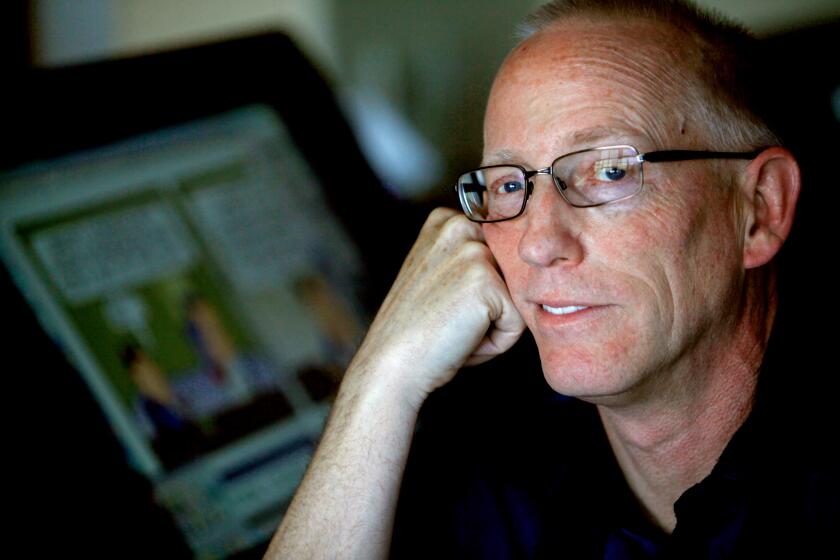Prime time can still sell ads
- Share via
Despite lower prime-time ratings and a weak economy, the broadcast networks dodged a bullet as they wrapped up their advance advertising sales for the coming season Monday.
When final sales are tabulated, the five major broadcasters -- ABC, CBS, Fox, NBC and CW -- should bring in nearly $9.2 billion in prime-time business, about the same total as last year. But the networks had to sell more inventory to maintain that level.
It could have been worse. The networks just closed the books on the weakest season in memory. There were no break-out hits, and the writers strike forced the networks to air reruns, chasing viewers away. The 100-day strike also disrupted program development, so advertisers opened their purse strings even though in many cases they haven’t yet seen the new shows.
Only last month, some Wall Street analysts predicted that the so-called upfront market -- when TV networks sell the bulk of their commercial time -- could be off as much as 14% versus 2007. The pessimism was prompted by slumping ratings, lower ad sales at TV stations and growing audiences for cable channels, which are luring away ad dollars.
“People have a lot of choices,” said Mike Shaw, ABC’s president of sales and marketing. “When you see this validation for television, and of network television and ABC in particular, it is a pretty strong affirmation of what we were bringing to market.”
Walt Disney Co.’s ABC and News Corp.’s Fox Broadcasting were the market leaders. Fox garnered the biggest ad rate hikes, in some cases 10% above last year’s prices, people familiar with the company’s negotiations said.
Fox declined to disclose how much it sold, saying only that it had wrapped up ad sales “at volume and pricing levels consistent with the No. 1 network.” People familiar with Fox’s negotiations said the network, which boasts the hits “American Idol,” “House” and “24” boosted ad sales by more than $100 million above last year. That would mean Fox generated about $2 billion in sales for its 15 hours of prime-time programming. (ABC, CBS and NBC each program 22 hours in prime-time.)
ABC also won rate increases of 7% to 9%, in large part, based on the strength of such popular shows as “Lost,” “Desperate Housewives” and “Grey’s Anatomy.” ABC did not have pilots ready, but Shaw said advertisers liked the concepts of several new shows, including “Life on Mars,” a remake of a British hit about a detective who is transported back to 1973, and the animated “The Goode Family” from Mike Judge, creator of “King of the Hill.”
ABC hopes to attract more male viewers next season. The network has had a female-skewing audience since Disney moved “Monday Night Football” to ESPN. ABC sold more than $2.4 billion in prime-time ads this year, slightly more than in 2007.
CBS was close behind, with nearly $2.4 billion in sales, according to one network executive who did not want to be identified discussing financial information. The network, which airs “CSI: Crime Scene Investigation” and “Two and a Half Men,” was able to raise rates about 5%.
Last week, NBC said it sold nearly $1.9 billion in prime-time ads. CW, a joint venture between CBS Corp. and Warner Bros., took in more than $350 million in commitments.
TV executives also said that more advertisers participated in the upfront market than in recent years, helping to drive up rates. Advertisers who sat on the sidelines during the last two markets paid rates 30% higher to buy time in the “scatter” market later in the year.
“We seemed to see more scatter money flowing to the upfront, and the networks appeared to sell deeper to accommodate,” said Chris Boothe, president of Starcom USA, a major ad-buying firm. “Some clients still need the reach of network TV.”
Michael Nathanson, a media analyst at Bernstein Research, said he doesn’t read “too much into the upfront as a future indicator of advertising growth.” That’s because there are so many variables, including the ratings that the shows will generate.
Advertisers lock up time in the annual upfront bazaar to protect themselves from the vagaries of the marketplace. The networks guarantee the ratings they sell and, if they fall short, they compensate the advertiser with extra time. Advertisers also can cancel their orders. Those who wait risk spending more money down the road without the same guarantees.
“If you are an advertiser, you want to have your money down on the table,” Nathanson said. “As a buyer, you would be a fool not to make a reservation in next year’s market.”
--
More to Read
The biggest entertainment stories
Get our big stories about Hollywood, film, television, music, arts, culture and more right in your inbox as soon as they publish.
You may occasionally receive promotional content from the Los Angeles Times.











